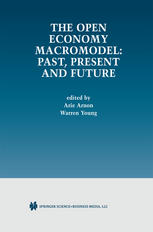

Most ebook files are in PDF format, so you can easily read them using various software such as Foxit Reader or directly on the Google Chrome browser.
Some ebook files are released by publishers in other formats such as .awz, .mobi, .epub, .fb2, etc. You may need to install specific software to read these formats on mobile/PC, such as Calibre.
Please read the tutorial at this link: https://ebookbell.com/faq
We offer FREE conversion to the popular formats you request; however, this may take some time. Therefore, right after payment, please email us, and we will try to provide the service as quickly as possible.
For some exceptional file formats or broken links (if any), please refrain from opening any disputes. Instead, email us first, and we will try to assist within a maximum of 6 hours.
EbookBell Team

4.4
72 reviewsThe impetus for the conference that was the basis for this volume emanated from the influence of two brilliant minds-Egon Sohmen and Adam Klug, who both died at an early age, leaving their families and the professions of economics and economic history with major voids. In the course of research on the origins of Open Economy Macroeconomics, the significant contributions of Egon Sohmen came to the fore. After correspondence with some of those involved in the early development of the Open Economy Macromodel, we turned to Adam Klug for his views on the matter-as he had dealt with the history of intertemporal trade models in his Ph. D. thesis. And it was Adam who suggested the idea of a conference bringing together economists and economic historians. At this point we want to acknowledge the very generous grant from the Egon Sohmen Foundation and the active participation of Dr. Helmut Sohmen and Mrs. Renee Sohmen at the conference. We also want to thank Prof. Sir Aaron Klug, Nobel Laureate, and the Klug family for their support and the financial contribution of the Adam Klug Memorial Lecture Fund at Ben Gurion University. Other institutions that contributed to the conference were the Gianni Foundation; Bank of Israel; University of North Carolina; Department of Economics, Faculty of Social Science and Aharon Meir Center for Banking, Bar Ilan University; Department of Economics and Faculty of Social Science, Ben-Gurion University of the Negev.